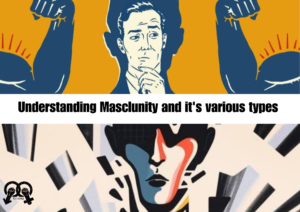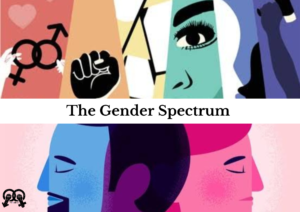
Credits: Apoorva Jyoti (Graphics Head at Mandonna)
What is Transnational Feminism?
Transnational Feminism is a contemporary feminist paradigm as well as an activist movement. Its idea is concerned with how globalisation and capitalism affect people based on their race, class and sexuality. It emphasises interactions across boundaries as well as the space between national boundaries. It should be noted that this particular tradition is not called “global” or “international”. The reason behind this is the fact that these terms are exclusive in nature. It refers to nation-states as having distinct identities rather than a globalised homogeneous identity.
This concept was mainly discovered by Indrepal Grewal, a Professor at Yale University and Caren Kalpan, a Professor at the University of California. They authored a book in 1994 named ‘Scattered Hegemonies’. They criticised global feminism for excluding the “diversity of women’s agency” and constructed a theory of “hegemonic oppression under a unified category of gender”. Another fine work on transnational feminism is M. Jacqui Alexander’s book ‘Feminist Genealogies, Colonial Legacies, Democratic Futures’.
Features of Transnational Feminism
Transnational Feminism is mainly based on the diverse and manifold experiences occurring within, between and at the margins of national and international boundaries. It encompasses the lived experiences of immigrants, refugees, and displaced people who have acquired a multicultural diasporic background. For example, Rhacel Salazar Parreñas in her ground-breaking book ‘Servants of Globalization’ studies migrant Filipino domestic workers who leave their own families behind to do the caretaking work of the global economy. She explores the role of domestic workers, their separation from their own children and the plight of ageing care workers.
It focuses on the concept of intersectionality. It is an enhanced form of global feminism which presents us with a multi-dimensional concept, giving voice to the non-western, people of colour who face different forms of exploitation and oppression. Therefore, transnational feminism also takes into account historical perspectives of gender, class, nationality and race.

It deconstructs the notion that women all over the world face the same type of discrimination, ways of discrimination and experiences under the privileged patriarchal system. It also acknowledges the disparity between women in diverse parts of the world, especially the divide between the Global North and the Global South.
The idea of transnational feminism was born out of postcolonial and women of colour feminism. It takes into account power different factors like colonialism, neo-colonialism, capitalism and imperialism. For example, for feminist scholars, nationalism is a way for the patriarchal elites to come to power.
It seeks to achieve unity among women living under different kinds of oppression under the global system of economic exploitation. For example, it considers neoliberal economic hegemony as a threat to women in the third world. The deregulation of trade and setting up of institutions is seen as an advancement of the interests of the multinational corporations, and by extension, dangerous for women. This is because transnational feminists believe that capitalism is intrinsically linked with the oppression and exploitation of labour, especially of women.
The Importance and Relevance of Transnational Feminism: Examples Across the World
Have you ever wondered how immigration and feminism are related? Also, why the West portraying itself as a saviour of women’s rights is dangerously wrong.
The practice of transnational feminism lies in its movement. It challenges the exclusivist idea of global feminism, especially the liberal feminist theory that is considered exclusive of women from diverse backgrounds, especially BIPOC backgrounds (i.e. Black, Indigenous, Persons of Colour). It examines their struggles in the context of labour politics and globalisation. Transnational feminism has made feminism more inclusive and representative in nature. The transnational feminist movement addresses the issue of intersectional oppression, for example, women belonging to minority communities in a country with wide wealth disparities.
It calls for politics rooted in solidarity rather than an assumed shared experience. Transnational Black Feminism is based on the history of black feminism, especially the writings of Anna Julia Cooper and Ida B. Wells. It calls for a gendered analysis of racial capitalism. Another example of transnational feminism in practice is Nadine Naber’s book “Arab and Black Feminisms: Joint Struggle and Transnational Anti-Imperialist Activism,” which traces the formation of the diasporic anti-imperialist Arab feminist group and the Women of Color Resource Center in the United States. The book mainly focuses on the history of the 1960s and 1970s and the alliances among Black feminist thought, radical women of colour movements, and Palestinian history. The idea of gendered oppression is linked with capitalism and imperialism. Similarly, the black lives matter movement is based on the idea of intersectional feminist activism.
Transnational Feminism has also forged deep alliances with Palestinian women by linking their call for gender equality with their call for national integration. According to feminist researchers, this has created a feminist response to the political and humanitarian crisis in Palestine.
To conclude, the future of feminism belongs to Transnational Feminism. It is a truly collaborative approach to the problem of gender inequality—the above examples attest to this.
References
Dutt-Ballerstadt, R. (2022, June 1). Transnational Feminisms. Pressbooks. https://open.oregonstate.education/womenworldwide/chapter/transnational-feminisms/
Chauhan, T. (2022, August 26). Transnational Feminism: An Intersectional, Collaborative, Reflexive Approach To Feminism. Feminism in India. https://feminisminindia.com/2022/08/26/transnational-feminism-an-intersectional-collaborative-reflexive-approach-to-feminism/
Transnational Feminism. (n.d.). https://warwick.ac.uk/fac/arts/history/students/modules/hi996/week7/#:~:text=Its%20focus%20has%20thus%20been,states%20at%20the%20transnational%20level
About the Author
Sourishree Ghosh is currently pursuing her bachelor’s in Political Science from Jadavpur University, Kolkata. She is passionate about social and political issues and loves to write about them. Her hobbies include reading fiction books, painting, sketching and creative writing.




